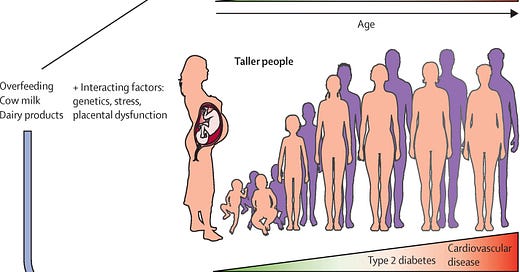Why Shorter People Live Longer (and How Muscle Changes the Game)
Size, Aging, and Muscle Loss
Neuro Athletics is a 2 x weekly newsletter that breaks down the medical and scientific practises that you need to perform at your peak. Subscribers include professional athletes, athletic trainers, coaches and casual fans. So if you are not already a subscriber, sign up and join 68,000+ others who receive it directly in their inbox each
Story at a Glance:
Body Size and Aging: Studies show that shorter individuals tend to live longer, independent of obesity, due to lower levels of growth hormone and IGF-1, which drive aging.
Muscle as Longevity Currency: Maintaining muscle mass is critical to longevity—particularly for women 45-55—yet traditional fitness advice often ignores the role of resistance training.
Strategic IGF-1 Modulation: Instead of chronically suppressing IGF-1, a balance between fasting, strength training, and targeted protein intake is the key to longevity and functional aging.
Neuro Athletes,
The Truth About Body Size and Lifespan
I see some gurus on Instagram telling you things about longevity, and I laugh sometimes. They focus on the wrong things—like obsessing over extreme diets, ignoring the fundamental science of how body size affects lifespan.
Studies on human populations show that shorter individuals tend to live longer. And it's not about obesity—this holds true even when controlling for body fat.
The reason? Growth hormones that drive body size also accelerate aging. Research, including a study published in the Journal of Epidemiology and Community Health, confirms that taller individuals have a higher risk of age-related diseases, including cancer and cardiovascular conditions.
Dr. Thomas Samaras, a longevity researcher, has extensively studied the relationship between height and lifespan. His findings, particularly in Human Biology (2002), suggest that lower levels of growth hormone and IGF-1 contribute to increased longevity—but they must be balanced to maintain muscle mass.
What You Need to Do About It
You can’t change how you grew up, but you can control what happens now. Here’s how:
Muscle Mass is Your Armor Against Aging – While smaller individuals may live longer, it’s muscle mass that determines how well you age. Sarcopenia (muscle loss with age) is a direct risk factor for mortality. You need to be resistance training—period.
Protein is Essential—But Be Strategic – People pushing ultra-low-protein diets for longevity are clueless. Yes, excessive IGF-1 in youth accelerates aging, but in adulthood, adequate protein is essential for maintaining muscle mass and preventing frailty.
Cycle mTOR and IGF-1, Don’t Chronically Suppress Them – Instead of permanently suppressing IGF-1 (which can weaken muscles and bones), use a targeted approach:
Lower it with fasting, caloric restriction, or plant-based meals on some days.
Increase it post-workout with high-quality protein to stimulate muscle growth.
This approach allows you to maximize muscle while minimizing aging acceleration—something most longevity “experts” get completely wrong.
Today’s Newsletter Is Brought To You By Eight Sleep!
I’ve been using an Eight Sleep mattress for several years now, and it’s one of the best products I’ve ever purchased.
Their thermo-regulation technology — the bed gets colder or warmer throughout the night depending on individualized health metrics — helps me fall asleep faster, get higher-quality sleep, and wake up feeling energized.
The best part?
If you sleep with someone else in your bed you can split the mattress in half and change the settings. How cool is that!!
Use code NEURO to get $200 off Pod 4 and $350 off Pod 4 Ultra.
The Female Longevity Factor: What Women 45-55 Must Know
If you’re a woman between the ages of 45-55, this information is even more critical. As estrogen declines, so does its protective effect on metabolism, muscle, and bone density. This is why postmenopausal women face higher risks of osteoporosis, sarcopenia, and metabolic diseases. The kicker? Losing muscle accelerates aging, increases frailty, and shortens lifespan.
A large-scale study in The Journal of Bone and Mineral Research found that women who maintain muscle mass through resistance training have lower all-cause mortality and reduced risks of age-related diseases. Yet, the majority of women over 45 are still being told to prioritize cardio over strength training—a mistake that could cost them decades of quality life.
If you fall into this age group, here’s what you must do:
Prioritize strength training at least 3x per week to combat muscle loss.
Consume enough high-quality protein (at least 1.2-1.6g/kg of body weight daily) to support muscle maintenance.
Incorporate progressive overload—if you're not increasing resistance, you're not growing.
Be strategic with fasting and calorie restriction—excessive restriction without strength training leads to muscle breakdown.
Why Coaches Need to Know This
If you’re a human performance coach, this is the kind of knowledge that separates you from the amateurs. Your clients—especially women in midlife—are being misled. They’re told to eat less, do more cardio, and avoid muscle-building when, in reality, muscle is longevity currency.
The truth? Most fitness and health professionals have no idea how IGF-1, mTOR, and growth hormone actually impact longevity. If you want to be an authority in the space, you need to understand this.
Final Thoughts;
It’s time to stop following outdated advice and start training like your longevity depends on it—because it does.
Longevity isn’t just about living longer—it’s about living better. If you're serious about optimizing health, it’s time to stop parroting outdated advice and start following the actual science.
Stay healthy,
Louisa






95% of cancers are caused by environment/lifestyle, no matter how tall you are.